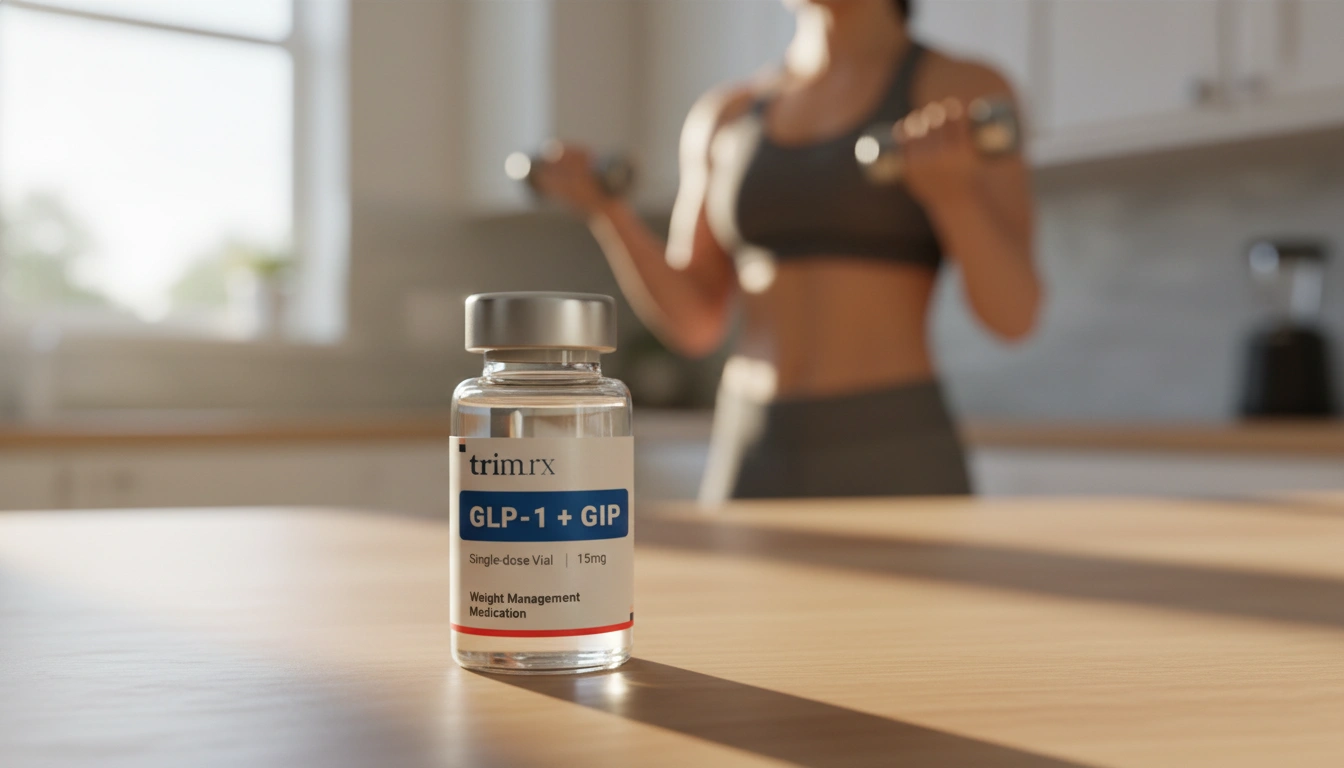How GLP-1 Medications Can Help Stop Food Noise

Introduction
Have you ever found yourself unable to focus on anything but food? If so, you’re not alone. Many individuals experience what’s commonly referred to as “food noise”—the incessant chatter in the mind regarding food choices, cravings, and the next meal. This phenomenon can create a significant barrier to effective weight management and a healthy relationship with food. In fact, a recent study showed that over 57% of individuals with obesity report experiencing continuous disruptive thoughts about food.
At TrimRx, we understand that navigating the complexities of weight management can feel overwhelming, especially when food noise interferes with your ability to make healthy choices. That’s why we’re dedicated to providing personalized, medically supervised weight loss solutions that empower individuals to embrace healthier lifestyles. In this blog post, we’ll explore how GLP-1 medications, such as semaglutide and tirzepatide, can help quiet food noise and support your weight loss journey.
We’ll delve into the concept of food noise, how GLP-1 medications work in the body and brain, and how they can facilitate a healthier relationship with food. By the end of this article, you’ll have a deeper understanding of food noise, the role of GLP-1 medications, and actionable insights to help manage your own relationship with food.
Understanding Food Noise
What Is Food Noise?
Food noise refers to the intrusive thoughts and preoccupations individuals experience about food. These thoughts can manifest as obsessive cravings, persistent planning of meals, or feelings of guilt related to eating. For many, food noise can lead to maladaptive eating behaviors and make weight management exceedingly difficult.
Research suggests that food noise is particularly prevalent among individuals with obesity or a higher body mass index (BMI). This is likely due to a combination of psychological, biological, and environmental factors. For instance, the modern food environment is saturated with cues that trigger cravings—think advertisements, social media, and easy access to highly palatable foods.
The Effects of Food Noise on Eating Habits
Food noise can be debilitating. It can lead individuals to ignore their body’s natural hunger and satiety signals, resulting in overeating and unhealthy dietary choices. In fact, those who experience higher levels of food noise are more likely to consume larger portions and eat more frequently, regardless of their actual hunger levels.
People often find themselves in a cycle of guilt and shame, which can further exacerbate feelings of food noise. Understanding this cycle is crucial for addressing the underlying issues and finding effective solutions to manage food-related thoughts.
Why Does Food Noise Occur?
The mechanisms behind food noise are complex and involve a multitude of factors:
- Psychological Factors: Stress, anxiety, and emotional states can amplify food noise. Many individuals turn to food as a source of comfort, which can create a feedback loop of cravings and consumption.
- Biological Factors: Hormonal imbalances and genetic predispositions can influence how our brains react to food-related stimuli. Neurotransmitters such as dopamine play a significant role in our reward pathways and can be affected by our eating habits.
- Environmental Factors: The omnipresence of food cues in our daily lives—social gatherings, food advertisements, and even social media—can trigger food noise and cravings.
Recognizing these factors can help individuals take a more comprehensive approach to managing food noise.
The Role of GLP-1 Medications
What Are GLP-1 Medications?
GLP-1 (glucagon-like peptide-1) medications, including semaglutide and tirzepatide, are a class of drugs originally developed to treat type 2 diabetes. They mimic the effects of a natural hormone that regulates appetite and insulin secretion, promoting satiety and reducing hunger. TrimRx offers a range of GLP-1 medications as part of our personalized weight loss programs, which are designed to help individuals achieve sustainable weight loss through medically supervised care.
How Do GLP-1 Medications Work?
GLP-1 medications work on multiple fronts to help manage food intake and promote weight loss:
- Delayed Gastric Emptying: GLP-1 medications slow down the movement of food from the stomach to the intestines, which prolongs feelings of fullness and reduces the frequency of cravings.
- Increased Satiety: By stimulating GLP-1 receptors in the brain, these medications enhance the sensation of fullness, making it easier for individuals to resist the urge to snack or overeat.
- Reduced Food Reward Sensitivity: Research indicates that GLP-1 medications may alter the brain’s reward pathways associated with food, leading to decreased cravings and less impulsive eating behavior.
The Impact of GLP-1 Medications on Food Noise
As individuals begin taking GLP-1 medications, many report a noticeable decrease in food noise. This reduction can be attributed to the medication’s ability to modulate hunger signals and improve the brain’s response to food-related cues.
For example, individuals who previously experienced obsessive thoughts about food often find that these thoughts diminish over time. They report feeling more in control of their eating habits and better able to focus on nourishing their bodies rather than succumbing to cravings.
At TrimRx, our mission is to provide personalized care that recognizes the unique challenges each individual faces in their weight loss journey. By incorporating GLP-1 medications into our comprehensive weight loss programs, we empower our clients to not only achieve their weight loss goals but also to cultivate a healthier relationship with food.
Strategies to Manage Food Noise
While GLP-1 medications can play a significant role in reducing food noise, there are additional strategies individuals can implement to further support their weight loss journey. Here are a few actionable tips:
1. Practice Mindful Eating
Mindful eating involves paying full attention to the experience of eating and drinking. This practice allows individuals to develop a greater awareness of their body’s hunger and fullness cues, ultimately reducing food noise. Here are some tips to get started:
- Eat slowly and savor each bite.
- Eliminate distractions, such as screens or multitasking, during mealtime.
- Focus on the flavors, textures, and aromas of your food.
2. Seek Support
Working with a healthcare professional, such as a registered dietitian or a weight loss coach, can provide valuable guidance and support in managing food noise. At TrimRx, our team is dedicated to offering compassionate care that respects each individual’s unique journey.
3. Create a Balanced Meal Plan
Developing a balanced meal plan that includes a variety of nutrient-dense foods can help stabilize blood sugar levels and reduce cravings. Incorporating high-fiber foods, lean proteins, and healthy fats can promote satiety and help manage food noise.
4. Stay Active
Regular physical activity has numerous benefits for both physical and mental health. Exercise can help regulate appetite, improve mood, and reduce stress, all of which can contribute to lower levels of food noise.
5. Utilize GLP-1 Medications
If you’re struggling with food noise, consider taking our free assessment quiz to determine your eligibility for our prescription weight loss medications. By working with TrimRx, you can receive personalized care that supports your weight loss goals and addresses the challenges associated with food noise.
Conclusion
Food noise can present a significant challenge to individuals seeking to manage their weight and foster a healthier relationship with food. However, with the help of innovative solutions like GLP-1 medications, many individuals are finding success in quieting the persistent chatter of food-related thoughts.
At TrimRx, we believe in a comprehensive approach to weight loss that emphasizes personalized care, science-driven solutions, and supportive guidance. By integrating GLP-1 medications into our weight loss programs, we empower our clients to achieve their health goals while navigating the complexities of food noise.
As you reflect on your own relationship with food, consider how these insights may be relevant to your journey. If you’re ready to take the first step toward achieving your weight loss goals, we encourage you to take our free assessment quiz. Together, we can work toward a healthier, happier you.
FAQ
What is food noise?
Food noise refers to intrusive thoughts and preoccupations about food, which can lead to unhealthy eating behaviors and difficulties in managing weight.
How do GLP-1 medications help with food noise?
GLP-1 medications work by promoting satiety, delaying gastric emptying, and reducing sensitivity to food-related rewards, which can help quiet food noise and support healthier eating patterns.
Can everyone benefit from GLP-1 medications?
While many individuals may benefit from GLP-1 medications, it’s important to consult with a healthcare professional to determine eligibility and ensure a personalized approach to weight loss.
What strategies can help manage food noise?
In addition to GLP-1 medications, strategies such as mindful eating, seeking support, creating balanced meal plans, staying active, and practicing stress management can all contribute to reducing food noise.
How can I learn more about TrimRx’s weight loss programs?
To learn more about our personalized weight loss solutions, we invite you to take our free assessment quiz. This will help determine your eligibility for prescription weight loss medications and guide you on your journey to a healthier lifestyle.

Transforming Lives, One Step at a Time
Keep reading
Vitamin B12 and GLP-1 Medications: What to Know
GLP-1 medications can lower B12 absorption and intake; learn symptoms, food sources, supplement options, and how to monitor levels.
Semaglutide Injection Site Reactions: What To Know
Learn why semaglutide injections can cause redness, swelling or nodules, how to prevent and treat them, and when to seek medical care.
TrimRx vs Friday’s
Compare TrimRx and Friday’s telehealth GLP-1 weight-loss programs: pricing, medical support, coaching, delivery, and which fits your needs.



